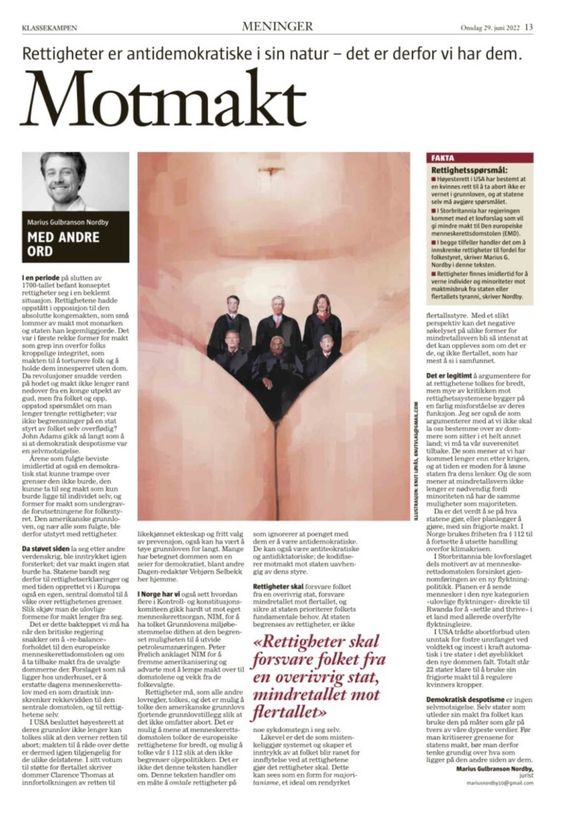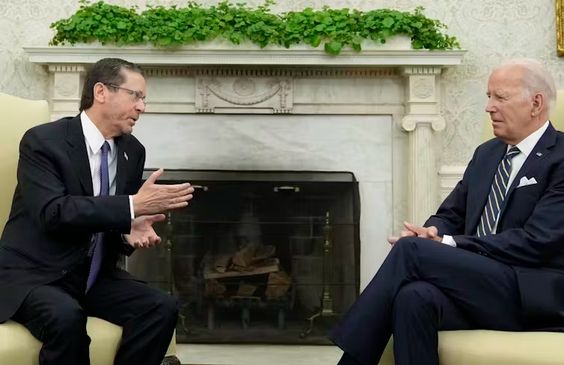Human Rights exist to protect individuals and minorities against abuse of power by the state or the tyranny of the majority.

by Marius Gulbranson Nordby, Jurist original published first in Klassekampen June 29. 2022
FACTS ABOUT HUMAN RIGHTS ISSUES
- The Supreme Court in the USA has ruled that a woman’s right to have an abortion is not protected in the constitution and that the states themselves must decide the issue. [The week before, the Supreme Court ruled that “concealed weapons” is no longer up to the states themselves to decide upon: An individual who wants to carry a firearm outside his home may obtain an unrestricted license to “have and carry” a concealed “pistol or revolver” if he can prove that “proper cause exists” for doing so.]
- In the UK, the government has introduced a bill to the house of commons that will give less power to the European Court of Human Rights (ECHR)
For a period in the late 18th century, the concept of human rights was in an awkward situation. Rights had arisen in opposition to the absolute power of kings, as small pockets of power were opposed to the monarch and the state he embodied. It was primarily forms of power that interfered with people’s bodily integrity, such as the power to torture people and keep them imprisoned without a trial. When revolutions turned the world upside down and power no longer flowed down from a king appointed by God but from the people and up, the question arose of whether one needed rights anymore; weren’t restrictions on a state ruled by the people themselves superfluous?
John Adams Founding Father who served as the second president of the United States from 1797 to 1801, went so far as to say that democratic despotism was a contradiction in terms. The years that followed proved, however, that even a democratic state could trample over borders it should not, it could absorb power that should only lie with the individual himself, and forms of power that undermined the conditions for democracy. The US Constitution, close to everyone who followed, was therefore furnished with rights.
When the dust settled after World War II, the impression was reinforced again; there was forms of power no state should have. The states, therefore, committed themselves to declarations of rights, and in time we in Europe also established a separate, central court to guard over the borders of these rights. In this way, the European states further pushed the illegal forms of power away from themselves. This is the backdrop we must remember when the British Government talks about “re-balancing” relations with the European Court of Human Rights and about taking back power from the unelected judges there. The proposal that now lies in the house of commons is to replace the current human rights law with one that drastically restricts the scope of the central court, and of the rights themselves.
In the United States, the Supreme Court ruled that their constitution can no longer be interpreted as protecting the right to abortion; the power to rule on this issue is therefore again available to the various states. In his vote in support of the majority, Judge Clarence Thomas writes that the interpretation of the right to same-sex marriage and free choice of contraception may also have stretched the constitution too far. Many have described the verdict as a victory for democracy, among them the editor of the newspaper Dagen, Vebjørn Selbekk.
In Norway, at the Norwegian Parliament, Stortinget, we have also seen how several members of the Control and Constitution Committee took a hard line against their own human rights body, “Norges Institusjon for Menneskerettigheter” or “NIM,” for having interpreted the Constitution’s environmental provisions to the effect that it limited the possibility of expanding the petroleum industry. [The United Nations recommends that all States have a National Human Rights Institution to protect and promote human rights within their jurisdiction.]
Peter Frølich, the Control and Constitution Committee leader and representing the Progress Party, accused NIM of promoting Americanization and warned against shifting power over to the courts and away from the people’s elected representatives. Rights must, like all other laws, be interpreted, and it is possible to interpret the fourteenth amendment to the US Constitution so that it does not include abortion. It is possible to believe that the European Court of Human Rights interprets European rights too broadly, and it is possible to interpret our §112 so that it does not limit oil policy. That is not what this text is about. This text is about a way of discussing rights that ignore that their point is to be anti-democratic. They can also be anti-democratic and anti-dictatorial; they codify counter-power against the state regardless of its form of government.
Rights must defend the people from an overzealous state, defend the minority against the majority, and ensure that the state prioritises the fundamental needs of the people.
Rights shall defend the people from an overzealous state, defend the minority against the majority, and ensure that the state prioritises the fundamental needs of her people. The fact that the state is limited by rights is not in itself a sign of malfeasance. Still there are they who cast doubt on the system and create the impression that the people are being robbed of influence by the rights doing what rights are supposed to do. This can be seen as a form of majorityism, an ideal of pure majority rule. With such a perspective, the negative spotlight on various forms of minority protection can become so intense that people begin to feel that it is the minority, and not the majority, who have the most say in society.
It is legitimate to argue that rights are interpreted too broadly, but much of the criticism of the rights systems is based on a dangerous misunderstanding of their function. I also see those who argue that we should not be ruled over by judges sitting in a completely different country; we must take back our sovereignty. Those who believe that we have come further than after the War, and that the time is ripe to free the state from its shackles. And those who believe that minority protection is no longer necessary because the minority now has the same opportunities as the majority. It is then worth looking at what the states do or plan to do with their liberating power. In Norway, the freedom from §112 is used to continue to delay action in the face of the climate crisis.
In the United Kingdom, the bill was partly motivated by the fact that the Human Rights Court delayed the implementation of a new refugee policy. The plan is to send people in the new category of “illegal refugees” directly to Rwanda to “settle and thrive” in a country with overcrowded refugee camps.
In the United States, abortion bans without exception for fetuses conceived by rape and incest came into force automatically in three states at the time of the new verdict. A total of 22 states are ready to use their liberated power to regulate women’s bodies.
Democratic despotism is no contradiction. Even states that derive their power from the people can use it in ways that transcend our deepest values. Before criticizing the limits to state power, one should think carefully about what lies on the other side.




Comments are closed.